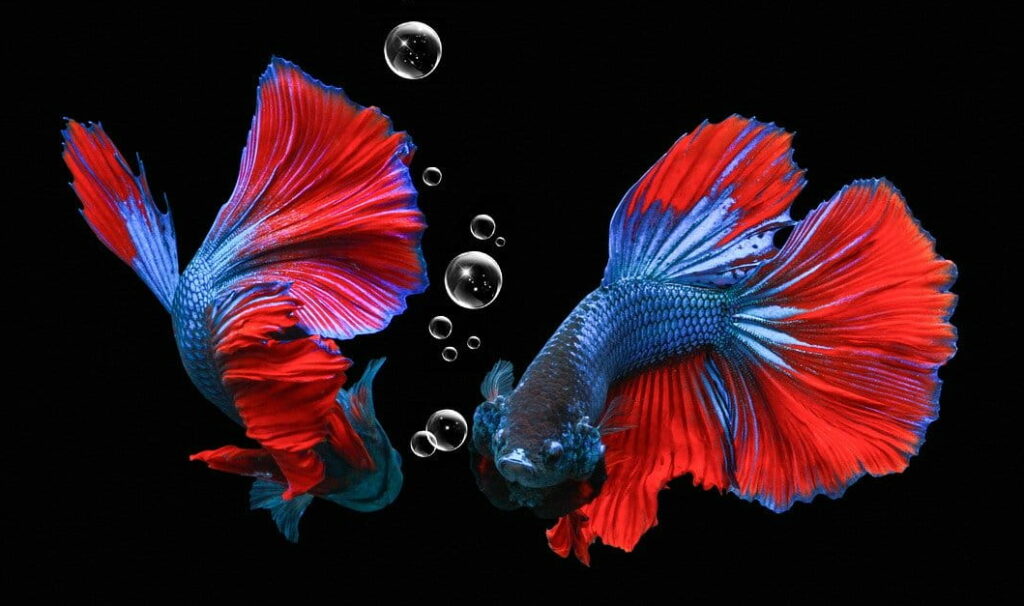Betta fish are among the most popular pet fish worldwide. They have lovely colors, and they’re fun to watch. Taking care of them isn’t hard, you just need to know a few things about their habits in general and the specific things that your fish likes.
Betta fish are picky eaters, and often they have a preferred type of food, so you might try a few brands to know which ones your bettas like best. You also have to be consistent with their feeding schedule, which starts with how often and how much to feed a betta fish to keep it happy.
A Bit About Betta Fish
Your brightly colored pet fish is different from the original bettas, which live in southeast Asia. There are about 73 species of Betta, but the most popular is Betta Spelendens; the one you have in your tank.
It’s a shallow water labyrinth fish, as it naturally lives in rice paddies and canals. It has a special organ that allows it to breathe in oxygen directly from the air, not just that dissolved in water. That’s why it keeps popping to the surface, and likes to eat its food up there before it sinks to the bottom of the tank.

Bettas are also called Siamese fighting fish, and as their nickname suggests, they’re carnivores that need a protein-based diet.
How Much To Feed Betta Fish
The Betta’s stomach is about the size of its eyeball, which is roughly 2-4 pellets per meal. Sometimes the food size doubles when it becomes wet, bear that in mind when you feed your fish.
Watch your fish as they eat, if they finish their food very quickly you might want to add a little more next time. If some of the pellets are always left over then reduce the amount.
The instructions on the pet food boxes usually recommend double the amount your fish needs. It’s always best to start with a smaller amount and increase the feed if your bettas devour their meal too fast.
How Often To Feed Betta Fish
Bettas like routine, so we recommend that you come up with a good schedule then stick to it. An adult betta needs about 1-2 feedings each day. Younger ones usually require more to grow properly.
The feedings should be separated by a reasonable amount of time. This should keep them energized and eager to eat at the next meal.
Leaving a day off is good for your pet fish, it lets it detox and relieves its digestive system for the day.
What Happens if You Overfeed Bettas?
Bettas tend to overeat when they find excess food, but that’s not good for them. They could easily get fat and become sluggish. It could also affect their bladder or stomach.
The excess food remaining in the tank isn’t good for your fish. It decomposes and the tank water becomes contaminated with bacteria, which is an unsuitable environment for your betta.
What if You Forget to Feed Your Betta Fish?
Betta fish can easily go without food for a day or two, so if you keep one at work, it’d be fine over the weekend.
Three days of food deprivation can go without problems if you have a big tank and the water is clean. Bettas go into starvation mode if they stay without food any longer than that. They could still survive it, but their health becomes fragile and they can easily get sick after that.
What’s on the Menu?
Variety is always good. Some products can be given regularly while others should be used as treats. Here are some of the betta fish’s favorite foods.
Betta Pellets Blend
It’s a mixture of several nutrients in pellet form. The ingredients include krill, shrimp, rose algae, wheat germ, salmon, halibut, in addition to multivitamins and some fiber.
Pellets are easy to measure and their tastes are optimized for the bettas. They have sufficient nutrients and their protein content is suitable for the little carnivores’ needs.
Instant Baby Brine Shrimp
This is a type of food that should be offered as a variation, so it should be an occasional meal. It’s stuffed with nutrients that help your fish grow and enhances their color.
Bettas usually gobble it up as soon as it hits the tank, but you should be careful with offering it too often as it might affect the betta’s bladder.
Omega One Betta Buffet Flakes
The Betta buffet flakes are made from real fish. Their protein content is quite high, and they contain a salmon pigment which is believed to help brighten the Betta’s color.
There’s a binding protein in the flakes that keeps them from decomposing in the tank. You can simply scoop any quantities that remain after the feed.
Tetra Freeze-Dried Blood Worms
This is also more of a supplement than a daily meal. It’s very close to the food Bettas eat in their natural habitats. This is often clear in the fish’s excitement when you feed them worms.
The amount of protein in blood worms is significant. It helps them thrive but it’s not so good in excess.
Hikari Bio-Pure Freeze Dried Daphnia
Bettas enjoy live or frozen insects. Daphnia consists of water fleas and fruit flies. It’s mainly crude protein, crude fat, some fiber, and moisture.
This product is free from parasites and harmful bacteria, so you can give them a treat they love, without the risk of contaminating the tank.
It’s also packed with multivitamins that reduce any stress the fish might have. It should keep their temperament nice and sunny.
Some Parting Thoughts
The way betta fish eat reflects their mood. You can always tell if they’re happy or depressed by the way they act when you drop in their meals. This reaction isn’t always about how often you feed them or how much.
Keep an eye on how they respond when you give them a certain type of food. If they’re always enthusiastic when you put it in the tank but suddenly ignore it, then you may need to change something in their environment.
They might receive a new type of food coldly, but that doesn’t always mean that they’re depressed, maybe they just don’t like that brand.
Betta fish are very interesting to watch, and they like to socialize with their human friends. Take care of the little fellows, and as you know; strong relationships start with good food.
